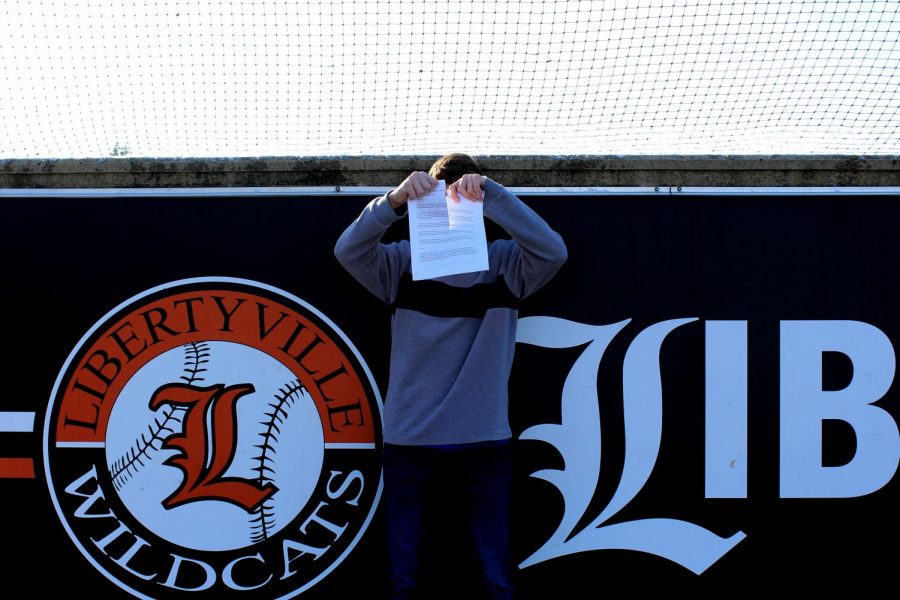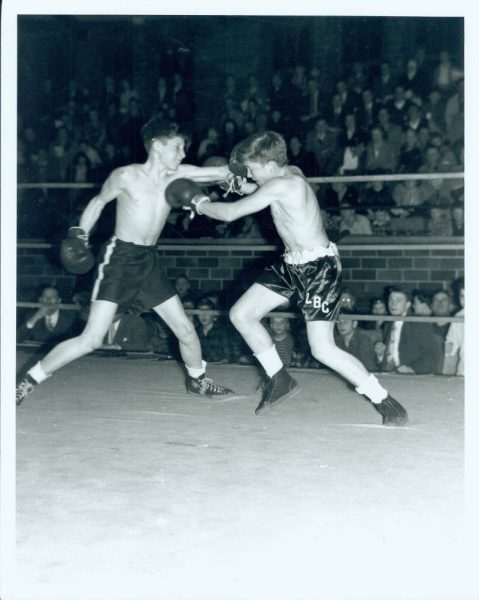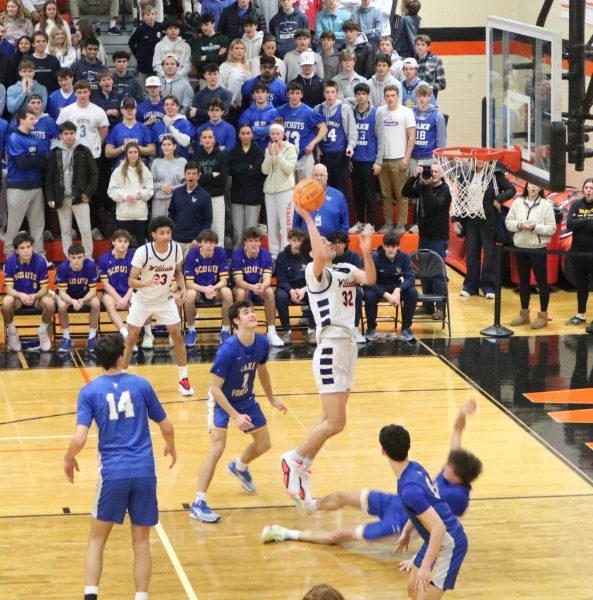Cracking Down on the Code
Every day, athletes are held under the district’s Code of Conduct, which applies “on or off campus, 24 hours a day, seven days a week, throughout the entire calendar year, including weekends and summer,” according to the Student Handbook. Although all athletes are held to the expectations in the code, the reality is that not all students who sign the code abide by it or take it seriously.
Twenty coded students were contacted to be sources for the story; only two agreed to participate. Those two students chose to be anonymous due to the negative stigma of being coded. Students’ reputations could be on the line for one mistake.
Finding Out
The school can find out about a code violation through the police, social media, a student-self report or an infringement of school rules, according to assistant principal Mr. Eric Maroscher. In the case of an arrest, the police notify the school of the student’s misconduct. This is how LHS was informed of one senior boy’s drinking ticket, which he received in October 2017: “The police notified the school about the ticket, and then I was called down to my LST on Tuesday, because it happened on a Saturday,” he explained. He is a multi-sport athlete.
“The problem is, because of the level of immaturity, sometimes when they are doing something they shouldn’t be doing, they get themselves caught,” noted Sergeant Andrew Jones of the Vernon Hills Police Department. Students sometimes throw loud parties, get into fights or commit retail theft, and the police department is called by witnesses.
When a police report is filed, “all reports are sent to our records division. Juvenile reports are then sent to our investigations division, and then they’re disseminated to the School Resource Officers,” Sergeant Jones explained.
In another instance, a junior boy, who runs track, was seen and reported for smoking weed in his car before school in the Butler Lake parking lot. “I’m not sure how I was caught. Mr. [Jason] Schroeder (team leader in the G-P LST) came into my class and called me down third period, and he read the whole scenario to me. I didn’t even tell him anything, he just found out,” he said.
“Another way [students are coded] is when a report is brought to us on social media, like a good one is you’ll get the kids that will throw a party where everyone’s bragging about drinking out of the red Solo cup and they’ll take pictures at the party,” said Sergeant Jones. “We’re not gonna charge those kids as a police department because we didn’t catch them, but if we report that to the school, the school can run its own investigation and determine if a Code of Conduct violation occurred.”
After LHS receives information on a code violation, a meeting is scheduled with the student and team directors to verify that their action was in fact against the Code of Conduct. If so, a follow-up Code of Conduct meeting with the student’s parents takes place.
Depending on which activities or athletics the student is involved in, code meetings can include parents, the fine arts director, athletic directors, club sponsors, social workers, coaches, team directors, the assistant principal, the school’s school resource officer (SRO) or others, according to Mr. Maroscher.
“During the Code meeting, the student has the opportunity to discuss the incident that has brought them to this meeting. The ultimate goal through these discussions and the code process is to provide the student an opportunity to reflect, restore relationships and learn valuable character qualities that will help them be successful in life and move forward,” stated Mr. Maroscher via email.
The Punishment
The consequences for a code violation are outlined in the Code of Conduct. The group of staff members included at the Code of Conduct meeting looks at those consequences and decides where the student falls, as different repercussions are taken for different violations. If an athlete violates the code, they can still practice with their team, but they are not allowed to compete for a certain percentage of the season.
As described in the Code of Conduct, the athlete’s first code violation will result in a suspension for 40 percent of their current season or their next season. A second offense results in an 80 percent suspension, and a third offense results in total exclusion from all extracurriculars for the rest of the athlete’s high school years.
The senior boy mentioned earlier faced an alcohol violation, so he had to sit out of his last football game on Saturday, Oct. 28. Also, he wasn’t allowed to ride the bus with the team, so he and another one of his teammates who had been coded drove down separately to support their team in East St. Louis.
According to the senior, the consequence he faced was “pretty rough” and “a very heavy penalty.” However, he “understand[s] that when people break the Code of Conduct, [the school has] to punish kids, so they don’t go down the wrong path.”
Code consequences may seem to be unfair to those not involved in the meeting, but certain confidential details, such as the number of previous violations, are factored into the student’s punishment. “For example, two students might have violated the Code of Conduct for an alcohol or drug offense, but it might be a first Code violation for one of the two students but for the other student it might be a second Code of conduct violation. A second Code of Conduct [violation] carries a much greater penalty, so [there are] two different levels of outcome for in essence the same offense,” explained Mr. Maroscher.
Reducing the Penalty
There are some ways an athlete who has been coded can reduce the duration of their suspension or how much it directly affects a certain season. For example, some students join another sport so they can carry out their punishment through that season rather than their primary athletic season.
The senior boy decided to join a winter sport so his consequence wouldn’t affect his spring sport. It would have been a seven-game suspension for his spring sport, which is one of his main sports, so he served his suspension in the winter.
The Code of Conduct does allow students to join an extra sport; however, athletes need to keep in mind that “they then must successfully train for, [and] follow all the rules and expectations for the sport and their coach. Further, they must complete the entire season in that other sport. Failure to complete the last week of the sport, for example, would serve to negate that entire season as an entire season must be completed,” explained Mr. Maroscher.
Another way to reduce the percentage of the season affected by the penalty is for the athlete and their parents or guardians to enroll in an educational program, which teaches students about the consequences of drugs and alcohol. For a first offense, the course decreases the penalty to a 30 percent suspension and for a second offense, a 60 percent suspension.
The junior boy took this course to reduce his punishment: “Since I was a really important part of the musical The King and I and it was really close to the performance, [Mr. Maroscher and Mr. Schroeder] said the only [way] you can do the performance is if you take this outside class for $20. It’ll lessen the punishment at the school.”
The Code of Conduct states that if the course is not completed within 60 days of the code meeting, the athlete will have to serve their original consequence.
Students can also self-report their violation to the school in order to only sit out of 20 percent of contests. If an athlete self-reports and completes the educational course, they will only be subject to a 10 percent loss of competitions. A student can only self-report one time in their high school career and only for a first offense. According to Mr. Maroscher, self-reporting is rare, but the overall number of students who have been coded was not released.
As of Jan. 1, the state’s Juvenile Reporting Act has been amended so that police departments only reports serious violations. Sergeant Jones is excited for this change: “I think some of the things we code kids for are absolutely ridiculous. So I’m okay if we make it more restrictive.” Sergeant Jones said students should only be coded for offenses that affect their health, not for TPing a house, for example.
“I would suggest to every kid, I know the handbook is ridiculously long, and I’m not saying you should read every part of it, but the part about Code of Conduct…you need to read that stuff and understand it,” Sergeant Jones advised. “You do not want to be sitting there one day going, ‘Well, I didn’t know I could get in trouble for that’ and find out you are.”




![Senior River Thompson joins the Jazz Ensemble by singing “That Old Black Magic” by Mercer and Arlen Arr. Mark Taylor, along with senior Annie Brody on guitar and junior Thomas Teixeira on bass, earning big applause. “[The concert had] great energy because it's the last [jazz concert] of the year,” Brody said.](https://www.lhsdoi.com/wp-content/uploads/2025/04/Eight-That-Old-Black-Magic-600x400.jpg)
![Mr. Abullh Ali, manager/assistant, helps open Queen Yemeni Coffee in downtown Libertyville at 606 North Milwaukee Ave. With the help of employees such as manager and LHS senior Yousef Taha, they are able to bring the Yemeni and Ethiopian culture to Libertyville by using their Queen spices, cinnamon and cardamom in their drinks such as Adani Chai, which is inspired by Sheda, the Queen of Yemen and Ethiopia. “The history of our coffee [is] a long history and we believe that Yemen and Ethiopia started the coffee and we are bringing something unique to the community,” Mr. Ali said.](https://www.lhsdoi.com/wp-content/uploads/2025/04/Photo-1-600x400.jpg)






![Senior Liam Hanson (1) is escorted by his parents before the game to celebrate senior night. He will miss “hanging out with [his] boys and going out to eat after games and practices.”](https://www.lhsdoi.com/wp-content/uploads/2025/02/IMG_1389-600x400.jpg)
